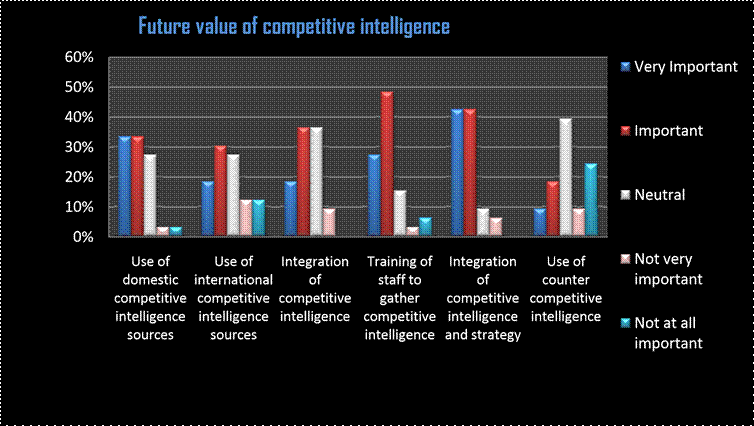• Use of counter competitive intelligence
Each respondent confirmed their importance. 66% believed that the use of domestic competitive intelligence sources was very important (33%) or important (33%), however, there was a 33% who believed that this element was neutral (27%), not very important and not at all important (3%). When asked about the integration of competitive intelligence and strategy, there was an 84% response that this element was very important (42%) or important (42%). Figure 15.0 provides the results of the analysis.
Figure 15.0 Future value of competitive intelligence

The research indicates the following key findings:
When comparing the perception of competition increasing and how companies/organisations have implemented unstructured and informal processes (for example, rumours and personal contacts) to monitor competition there is clearly a significant gap. This would suggest that within the current environment there is a complacent attitude by the surveyed companies/organisations to fully understand their marketplace in a structured and coherent process.
This theme is supported - when respondents were asked about implementing future plans to monitor competition half the respondents said yes (47%) they were planning to and the other half answered no (47%), there were 2 responses who were unsure (6%).
Competitor audits and benchmarking were highly valued as the best process for formally tracking competitors, while rumours and personal contacts remains the highest used medium (unstructured and informal).
The least favoured method of tracking competitors was the use of counter competitive intelligence, where 73% of respondents believed that this element was neutral (39%), not very important (9%) and not at all important (24%)
The results from the survey identified that 66% of respondents believe the use of domestic competitive intelligence sources are very important/important. However the current domestic competitive intelligence sources are inadequate and undeveloped. This is critical to the development of competitive intelligence and if not addressed, will impact the future uptake of competitive intelligence within New Zealand.
When asked about Government assisted programmes and support, 76% believed this element was neutral (21%), not very important (26%) and not at all important (29%). Only seven companies, who were heavily involved in trade or tourism, believed Government assistance was very important or important. This result confirms the current mindset of companies on the role of the New Zealand Government and limited focus/ emphasis on the global market place.
Content Analysis:
Analysis confirmed that there was the lack of formal structures and process used to measure and benchmark competitive information. Half of the respondents stated that they were planning to establish a more formal process by using third party resources/vendors to assist developing these processes and/or Customer Relationship Management solutions.
This is reflected by many of the respondents confirming the use of AC Nieslsen, who provides services like measure their market performance and analyse market dynamics.
The
results suggest that those responsible for maintaining competitive intelligence
operations is still the marketing department who has been tasked to identify
what the market, business strategy and direction, what are the new competitors products
being developed and what are the business drivers. The potential issue is that
this is outside the core function of a marketing team, which is focused on
branding and marketing campaigns.
![]()
Globalisation and rapid technology advancements, like the internet are having a profound change and impact not only in the way companies are operating, but in how it is changing and shaping New Zealand’s economy.
Уважаемый посетитель!
Чтобы распечатать файл, скачайте его (в формате Word).
Ссылка на скачивание - внизу страницы.